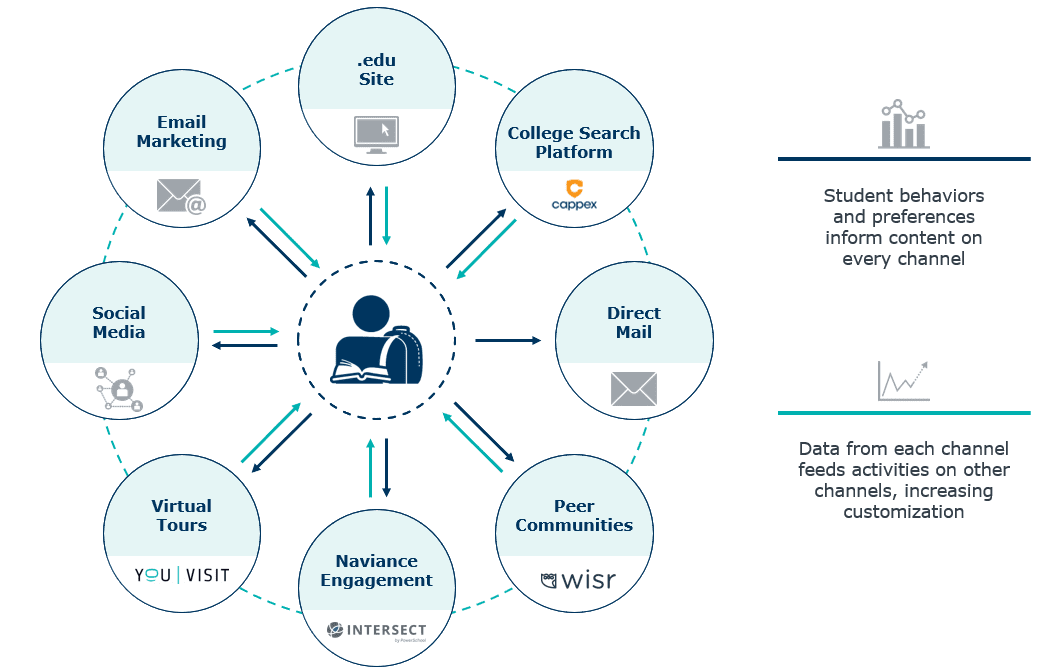Is the recruitment funnel gone for good?
It has become abundantly clear over the past few months that the old ways of describing recruitment—as something linear, like a path, journey, or funnel—no longer capture the complexity of students’ college search experiences today. We know that recruitment will continue to be dominated by growing populations of stealth applicants, diminishing efficacy of typical recruitment approaches, and a discerning audience with razor-thin attention spans.
In considering these shifts, my team at EAB (and the partners we work with) have begun to describe recruitment and enrollment as an “ecosystem.” But what is an ecosystem in this context, and how can this metaphor help enrollment leaders?
At the risk of dredging up memories from high school biology: Merriam-Webster defines an ecosystem as “the complex of a community of organisms and its environment functioning as an ecological unit.” An ecosystem includes not only the way organisms and their ecosystem interact with one another, but also the internal and external forces that impact them both.
The recruitment ecosystem is the (complex) way that schools interact with students and families and, in turn, the way those students engage with colleges and universities. And like a living ecosystem, the recruitment ecosystem is three-dimensional. Each node in the ecosystem provides an opportunity to connect and engage with students, learn more about their interests and preferences, and use those insights to further optimize the vitality and performance of the ecosystem as a whole.
Every interaction with a prospective student can make your recruitment smarter

Here are three things enrollment leaders need to thrive in this new recruitment ecosystem.
1. A robust channel strategy
First, you need access to emerging channels and platforms to both build awareness among the students you want to reach and generate leads. Test-taker names remain an important part of your audience mix. But as the number of students taking admissions tests decline, enrollment leaders need to identify new and innovative sources of students. In addition to traditional search lists and organic interest, our Enrollment partners have had success sourcing students from a combination of virtual efforts, such as their virtual tours and digital channels, and students who raise their hand through the Cappex platform.
It’s also important your channel strategy includes a diverse range of sources. Sometimes, when using multiple sources to identify prospective students, you will come across the same student in several places. But more often than not, my EAB teammates have found there is little overlap within any school’s given campaigns—a testament to just how important it is to source students from a variety of places. We’ve also found that students who interacted with two or more sources were three to four times more likely to apply than students who interacted with only one source.
2. Responsive marketing, orchestrated seamlessly
At the heart of a thriving ecosystem is what my team has been calling responsive marketing—an approach to executing marketing campaigns that makes sure all students and families receive the right information, in the right format, in the right place, at the right time. Unlike traditional marketing, responsive marketing integrates insights about a given student from across channels to enable colleges and universities to engage with that student at their precise moment of intent.
Let’s take Emma, a student who I wrote about in my last blog post, as an example. Emma indicates interest by searching on Google and landing on Cappex. Using responsive marketing, your institution can follow up immediately with personalized, meaningful communications based on what you know about Emma from her engagement across channels in the ecosystem.
Of course, not every student will take the same path as Emma. And that’s okay. Responsive marketing enables you to meet each individual student where they are with the right combination of digital assets and data insights. The results speak for themselves: Students included in EAB Search Campaigns and that take a virtual tour are 3.5x as likely to apply.
3. Immersive digital content
I mention digital assets as a key part of the ecosystem because today’s students not only are accustomed to but also expect digital-first content catered to them. Your digital experiences need to both tell your institution’s story and enable students to create connections with peers. And whether a parent is taking a YouVisit virtual tour, or a student is chatting with peers in your WisrConnect community, these digital experiences need to feel authentic.
To thrive in today’s recruitment ecosystem, enrollment leaders need a fully staffed, modern marketing operation—an operation that focuses on what students want, when they want it, where they are, and how they behave. But few enrollment teams can take on the work of a deeply sophisticated marketing machine on top of their day jobs. That’s why EAB has evolved to provide the support and capabilities that schools need to succeed. These capabilities, and data they generate, amplify one another’s impact to help schools find and enroll their best classes.

More Blogs

15 more campus visit tweaks that win over students

What Blockbuster can teach enrollment leaders about AI-powered college search
